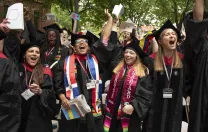As prepared for delivery:
Last summer, when I was doing my internship in Mongolia, I got a call from two classmates in Tanzania. They had a very urgent question: how to use their washing machine — because all the labels were in Chinese, and Google kept translating a big button as “Spinning Ghost Mode.”
There we were: an Indian and a Thai calling me, a Chinese in Mongolia, to decipher a washer in Tanzania. And we all study together here at Harvard.
That moment reminds me of something I used to believe when I was a kid: that the world was becoming a small village. I remember being told we would be the first generation to end hunger and poverty for humankind.
My program at Harvard is International Development. It was built on this exact beautiful vision that humanity rises and falls as one.
When I met my 77 classmates from 34 countries, the countries I knew only as colorful shapes on a map turned into real people - with laughter, dreams, and the perseverance to survive the long winter in Cambridge. We danced through each other’s traditions, and carried the weight of each other’s worlds. Global challenges suddenly felt personal.
If there’s a woman anywhere in the world who can’t afford a period pad, it makes me poorer. If a girl skips school out of fear of harassment, that threatens my dignity. If a little boy dies in a war that he didn’t start and never understood, part of me dies with him.
But today, that promise of a connected world is giving way to division, fear, and conflict. We’re starting to believe that people who think differently, vote differently, or pray differently—whether they’re across the ocean or sitting right next to us — are not just wrong. We mistakenly see them as evil.
But it doesn’t have to be this way.
What I’ve gained most from Harvard isn’t just calculus and regression analysis. It’s to sit with discomfort. Listen deeply. And stay soft in hard times.
If we still believe in a shared future, let us not forget: those we label as enemies—they, too, are human. In seeing their humanity, we find our own. In the end, we don’t rise by proving each other wrong. We rise by refusing to let one another go.
So, Class of 2025, when the world feels stuck in Spinning Ghost Mode, just remember: As we leave this campus, we carry everyone we’ve met — across wealth and poverty, cities and villages, faith and doubt. They speak different languages, dream different dreams, and yet—they’ve all become part of us. You may disagree with them, but hold onto them, as we are bound by something deeper than belief: our shared humanity.
Congratulations, Class of 2025!









